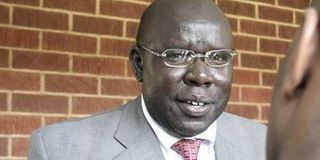MPs probe Kenyan varsities’ campuses in Rwanda, Tanzania

Commission for University Education Chief Executive Officer David Some. FILE PHOTO | NATION MEDIA GROUP
What you need to know:
- JKUAT has campuses in Tanzania and Rwanda, while Kenyatta University has one in Kigali, all offering undergraduate and post-graduate courses.
Prof Some said the law does not give the commission a role in accrediting courses outside Kenya, but they would crack down on them.
Universities in foreign nations are seen to be doing so for profit because they do not admit government students.
A parliamentary watchdog has launched investigations into how two Kenyan public universities invested millions of shillings to set up campuses in Rwanda and Tanzania.
The Public Investments Committee (PIC) in the National Assembly, chaired by Adan Keynan (Eldas, ODM), has asked vice-chancellors of Kenyatta University and Jomo Kenyatta University of Agriculture and Technology (JKUAT) to explain their investments in those countries.
This is after Prof David Some, the chief executive officer of Kenya’s university education regulator, the Commission for University Education (CUE), said the setting up of campuses outside Kenya was not approved by the commission.
The two universities have until Thursday to provide the information to the committee.
“The committee resolves to write to you to request for information on the investment of establishing and operating of the university’s campuses in Rwanda and Tanzania,” states the letter dated March 24.
In the letter, the committee specifically wants to know the number and locations of the campuses in the said countries, the rationale for establishing and opening the campuses outside Kenya, the total cost of the investments, the consent from the ministry of Education to invest and operate outside Kenya and whether the investment is in line with the statute establishing the two universities.
The universities are required to submit five copies of the requested information, including supporting documents.
The PIC is responsible for examining and monitoring public investments and ensuring that the public investments are managed in accordance with the sound financial or business principles and prudent commercial practices.
PUT ON NOTICE
Last month, CUE put on notice public universities setting up campuses outside the country, saying public institutions would have to justify doing so since they do not admit government-sponsored students to those campuses though they are funded by the exchequer.
Prof Some said the law does not give the commission a role in accrediting courses outside Kenya, but they would crack down on them.
“The commission does not recognise the campuses outside the country, which, according to the regulator, have failed to meet the criteria for establishing the units,” said Prof Some.
JKUAT has campuses in Tanzania and Rwanda, while Kenyatta University has one in Kigali, all offering undergraduate and post-graduate courses.
The University of Nairobi and the University of Rwanda recently held discussions on a partnership. Among the private universities, Mount Kenya has a campus in Rwanda.
Prof Some acknowledged that there was no policy to guide public universities in setting up campuses abroad.
This year, the government allocated Sh52.9 billion, up from Sh34 billion last year, to 31 public universities.
Kenyan universities with campuses in foreign nations are seen to be doing so for profit because they do not admit government-sponsored Kenyan students.
Regulations state that a campus should be the lowest unit of any university, and is required to have local administrative structures clearly linked to the main institution.
The 2015 Economic Survey showed that university enrolment rose by 22.8 per cent, from 361,379 in 2013 to 443,783 in 2014.
In 2015, an additional 100,000 students were admitted to public and private universities.





